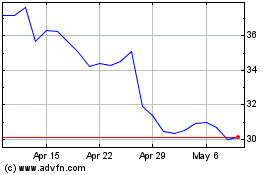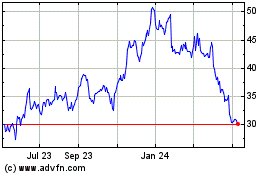Big Tech Reshapes Automotive Sector -- WSJ
March 15 2017 - 3:02AM
Dow Jones News
By Chester Dawson
Intel Corp. sent a fresh shock wave through the automotive
supply chain, becoming the latest tech company to gobble up a
specialized car components supplier. The Silicon Valley company's
$15 billion acquisition of Mobileye NV could unsettle established
auto makers, but it may be the type of big bet needed to populate
roads with self-driving vehicles.
Mobileye -- an Israeli company specializing in camera-based
software -- was attractive to Intel because of its head start in
high-tech automotive applications, including advanced cruise
control and braking systems designed to avoid crashes even if the
driver is unaware. Companies that can better connect or automate
vehicles are commanding large premiums not seen in the broader car
business.
"It shows there's an increasing belief that autonomous vehicles
and assisted driving through the levels is real and needs to be
industrialized," said Mark Wakefield, co-leader of the automotive
practice at consulting firm AlixPartners. Companies with deep
pockets and broad business portfolios are pouring into the auto
industry as a result.
For decades, auto makers treated suppliers as subordinate
partners, and dollars that flow from purchasing decisions have kept
parts makers afloat. Tech company investments may weaken auto maker
influence over the supply chain amid a race to reinvent automobiles
as smarter and safer.
The deal follows similar acquisitions in recent months such as
Samsung Electronic Co.'s $8 billion purchase of audio and
telematics supplier Harman International Industries Inc. and
Siemens AG's $4.5 billion takeover of Mentor Graphics Corp., which
producers design software for automotive and other applications.
Intel rival Qualcomm Inc. bought automotive chip supplier NXP
Semiconductors NV for $39 billion.
Recent acquisitions of auto makers by Nissan Motor Co. and
Peugeot SA resulted in much lower valuations for companies that
sells millions of vehicles. Mitsubishi Motor Corp. and Opel were
both snapped up for under $3 billion apiece.
Unlike the capital-intensive business of building cars,
supplying the guts of tomorrow's automobiles is a growth target for
spreading the Internet of Things. That involves embedding computing
power and connectivity into everyday objects, and making money from
cars that collect loads of data and become a platform for a suite
of services, much like a smartphone.
"It just shows you the kind of companies that are considering
this space interesting," said Ford Chairman Bill Ford, speaking at
the South by Southwest Interactive Conference in Austin after
Intel's deal was announced. "The question then for us at Ford is
are they friend or foe? And if they are foe can they turn into a
friend? There are great partnership opportunities out there."
Thus far, auto makers have struggled to compete with tech
companies in areas such as dashboard infotainment or mapping. At
the same time, tech companies have faced a learning curve and grown
to appreciate how difficult it is to build a car from scratch.
Ford, GM and others are investing heavily to catch up, spending
proprietary technology to develop autonomous vehicles or hiring
teams of software engineers. Others aren't plowing down that path
-- Fiat Chrysler Automobiles NV, for instance, is outsourcing its
self-driving program to Alphabet Inc.'s Waymo, formerly known as
Google's car project.
Both Apple Inc. and Google's parent have wavered on how they
want to enter the auto industry. Once thought to be considering
getting into car making, they have narrowed their scope to
autonomous driving systems, leaving the metal bending to Detroit
and its rivals.
"Auto companies need Big Tech as much as Big Tech needs auto
companies," said Phil Magney, founder of Minneapolis-based
technology research firm Vision Systems Intelligence. "They both
bring different assets to the table and realize they can't do it
all by themselves," he said.
Intel's acquisition seems to bear that out. The company remains
more than an arm's length from auto makers as Mobileye sells to
larger suppliers, not directly to vehicle assembly plants.
"Tech companies are realizing that auto suppliers [have] become
the critical 'bridge' into auto industry," said David Leiker, an
auto analyst with Robert W. Baird & Co.
Eliot Brown contributed to this article
Write to Chester Dawson at chester.dawson@wsj.com
(END) Dow Jones Newswires
March 15, 2017 02:47 ET (06:47 GMT)
Copyright (c) 2017 Dow Jones & Company, Inc.
Intel (NASDAQ:INTC)
Historical Stock Chart
From Mar 2024 to Apr 2024

Intel (NASDAQ:INTC)
Historical Stock Chart
From Apr 2023 to Apr 2024
